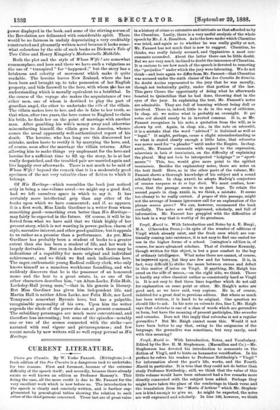Vergil, Ladd ix. With Introduction and Notes by A. E.
Haigh, M.A. (Clarendon Press.)—In spite of the number of editions of Virgil which already exist, and the fresh ones which are Con- tinually coming into existence, it is not easy to find one suited for use in the higher forms of a school. ikmington's edition is, of course, for more advanced scholars. That of Professor Kennedy, though written for this object, is but a poor comfort to the boy of ordinaiy intelligence. What notes there are cannot, of course, be improved upon ; but they are few and far between. It is, in fact, very difficult to strike the mean between excess and defect in this matter of notes on Virgil. If anything, Mr. Haigh his erred on the site of excess,—on the right side, we think - There is hardly any other classical author so consistently hard as Virgil is. It is not easy to find three lines together which do not call for explanation on some point or other. Mr. Haigh's notes are good and, as we have said, very copious. He is, of course, indebted for a great deal to previous editors. But where so much has been written, it is hard to be original. One question we should like to ask. In his note on volvenda dies, line 7, Mr. Haigh says that volvendus is one of a class of words which are gerundive
in form, bat have the meaning of present participles, like secundus
and rotundus. Does not this imply that volvendus is not a regular gerundive ? But Mr. Haigh cannot mean this. Would it not have been better to say that, owing to the exigencies of the language, the gerundive was sometimes, but very rarely, used with this meaning P






































 Previous page
Previous page